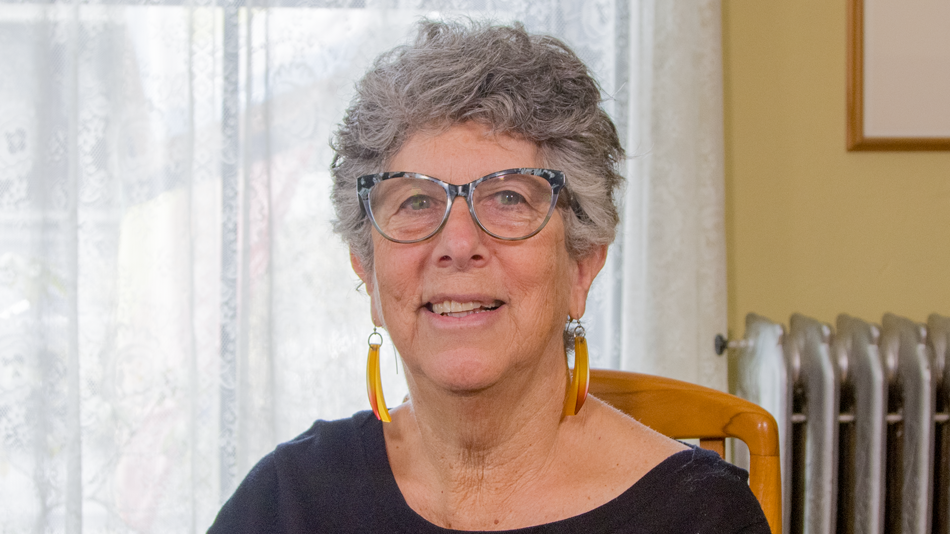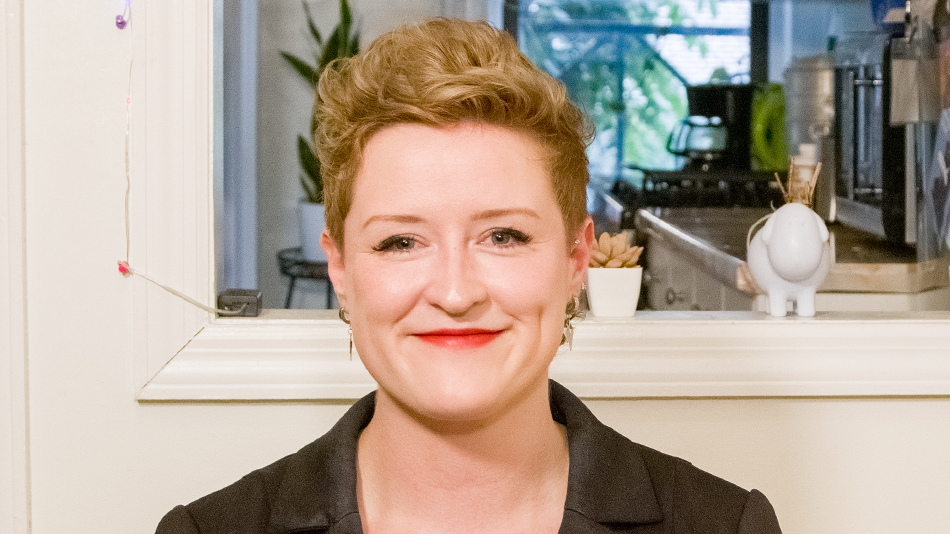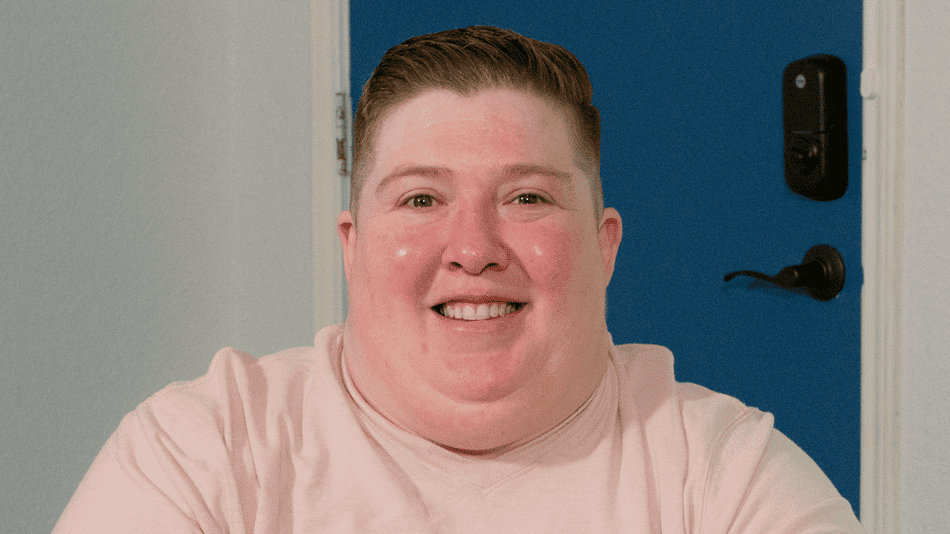Nathan: Welcome to this week’s Story Update. Today, we’re going to be speaking with Katie Hinchey-Wise who we spoke with about four years ago. But before we do, let’s take a look at her story.
Katie: My name is Katie Hinchey-Wise and I’m from Cape May Court House, New Jersey. When I was 19, I met this girl named Celeste. I asked her out on a date and we, our first date, went, we went to the Vagina Monologues at Penn. We went and ate crepes afterwards. And I can remember just being so inspired and thinking that we could change the world and that we already were changing the world.
We definitely fell deep, deep in love and we wanted a future together and all those things, but it was very clear that we were not going to be those people who got married regardless of whether or not the Supreme Court legalized.
Flash forward seven years and I was really involved in the Clinton campaign in West Philly, and I was lucky enough to be able to go to the Javits Center on the night Hillary Clinton was going to be elected. And so there I was, all night long and I waited in my white dress like a suffragette. And we were so excited and she was – Celeste lives in Colorado so we were texting all the time, just saying how excited we were. But clearly the night didn’t go as planned and as the night got darker and darker, I began to feel more and more despondent.
We got back to the car after we didn’t get to hear Hillary speak. And I got the NPR notification that she had called to concede. And my first thought was Celeste.
And so I immediately texted her and said “I don’t wanna be with anyone but you. I just don’t wanna do this without you. Can we please get married?”
And she immediately was like, “Yes, absolutely. We should probably talk about this tomorrow. But absolutely.”
So we started planning. And we decided that we were going to get married before the inauguration. So we assumed that it would just be us and that would be very small and we wouldn’t tell anyone. And all I wanted was the paper. And I was convinced if I got married it would be a political statement and that I would be showing the world through protest that I still have the right to do this, and that we deserve to do this.
For Celeste, it was very much about love in that we’ve been in love for all these years. And she just wanted to be a moment where we were able to celebrate ourselves. And I remember calling her from Paris a couple weeks into our engagement and being like, “You know this is going to be a protest!” and she was like, “Katie, it’s definitely about love.” And I was like, “No this is definitely a protest!”
When Celeste and I first started dating, when she was 19 and I was 20, a month into a starting to date, my dad had a massive stroke and he lost the entire left side of his, or the entire right side of his brain and she stayed with me through all of that. So my mom, the night before our wedding, just started talking about how much Celeste meant to our family. And as much as I know she’s my family as much as she’s always been there for me, I try to not get emotional about that kind of stuff. It’s taken a long time to be okay with my dad getting so sick and she was there with me through it all. But my mom just said that she had never given up on us. And I sat there I thought about that and I thought about putting them in my vows.
But as we got closer to the wedding we sat down to finish the ceremony by ourselves and Celeste right after that made me do a sheet, and in the sheet was our – she wanted us to write down our intentions for the day. And it wasn’t until we started doing that that I was like, “Oh. No. My intention today is to, yes stand up to the world. But out of these ten first word things, nine of them are about how much I love you and how much I want to be your wife. And one of them is about like, you know, screw the new administration.”
And then the bridal woman brought the dress over. Because I didn’t get to pick out my dress – everything was donated. So I just saw the dress for the very first time that day. And she brought the dress over and she had a veil. And I thought to myself, “All I’ve ever wanted – when I was little, I dreamed about what my wedding dress would look like. When I was three, my grandmother made me a wedding dress out of our curtains, and I used to wear it around the house all the time. And she put that veil on my head, and I was like, “Oh, no. This is real. Like, I am a bride.”
They had us separated and we were about to do our first look. And there she was. She’s Hawaiian and she had this big, beautiful long lei on, and I had a flower crown in my hair with the veil. And she turned around and she looked at me. And it was like, I couldn’t think of anything else. It was like, there was no protest. There was no Donald Trump. It was just about us. And it was about us loving each other and I always wanted her to look at me that way, like I was hers.
And so we, sorry for crying. We had our first look and we took pictures and we went in and started the ceremony and I was gone. I don’t remember most of the ceremony because I just cried. And she – just this calm peace came over her. All of her anxiety was gone. She just held my hand and smiled the whole time as I just dramatically wept.
There is no one that I’d rather have by my side than Celeste. She always said, “I think you need to marry a power lesbian” when we were younger. And so after I proposed, jokingly one night I said, “You know, you always said I needed to be with a power lesbian.” And she was like, “Yeah, I mean, but now I think that it’s okay that I’m not a power lesbian because I am the one holding the extension cord.” And I was like, “Thanks. Thanks so much. Always.”
Nathan: Okay, Katie, thank you for joining us. How are you?
Katie: Good. How are you?
Nathan: Doing pretty well, thanks. So there’s one thing that you mentioned in your story. You talked about how your wedding was donated. Can you kind of take us through that and how that happened and what that was like?
Katie: Yeah, sure. I’ve been working in LGBT activism in Philly since 2009. And so I’ve made a lot of friends along the way. And when Celeste and I got engaged, I contacted one of those friends who I knew was a wedding photographer, just to ask her for small venues for, like, just us and our parents and maybe one other person.
And really quickly she said, “Wait, you’re get…” She was so excited. “Oh my gosh, you’re engaged. Let me get back to you in an hour. I have an idea.” And so she got back to me and wedding photographers and all sorts of – all sorts of wedding vendors use these things called “styled shoots” to try and get advertising for themselves. Normally they hire brides – or brides and grooms – and she contacted all of her friends who were vendors. And because everyone was basically just devastated after the election, all these vendors who I’d never met before decided to come together and throw us a styled shoot at a beautiful little photography studio in Westchester. And we were actually able to invite 20 of our friends and family.
And we didn’t get to choose anything. Amanda worked with us to find out our likes, but we let ourselves be completely at the mercy of these wonderful, generous people. I didn’t see my wedding dress until that day. They came with the wedding dress, which is so crazy for a bride, but it turned out absolutely beautifully and we are so, so, so grateful.
They had all been told about my work by Amanda and every single vendor that we met was so generous and affirming and so kind. And they just wanted to be able to give me back some of the work that I had put in the community in this really beautiful and special way. So it was one of the best days of my life, for sure. And I am really, really grateful to all of the vendors still to this day who gave us such a beautiful day. People always are complimenting me on the wedding pictures and our choices and it wasn’t us. It was just our love.
Nathan: Wow. That’s really beautiful. I love that. Especially with the setting of… in which your story took place of, you know, how upsetting and depressing you all were about the results on election night. So we’re, you know, we filmed your story. I think it was literally on inauguration day, right?
Katie: It was. Yeah. I was one of the hosts members of the Creating Change conference and I got to meet up with you guys at the Creating Change conference and it was such a different world than the world we live in right now, four years later, almost.
Nathan: Yeah. So – and now we’re, we’re filming this. We have less than two months until the 2020 election. How are you feeling?
Katie: I think that I am feeling as hopeful as I can be. After we filmed, Celeste and I actually moved to Amsterdam in August of 2017. And I went for my master’s in social policy and social problems.
I had actually already been planning to go to the University of Amsterdam before the election happened, but I was completely unaware that a international social policy program would just be all about America. And I spent a year learning all about social policy from a European and an international perspective, but problematizing the American policy making situation.
So I feel that I can be hopeful because I know that our state department and all of these wonderful institutions can come back when we rebuild them if we get the chance to. I’m a little nervous about down-ballot voting, so I encourage everyone not just to vote for president, but to make calls for their senators and their local politicians, because even if we beat Donald Trump, if we don’t get the Senate, then we’re not going to able to accomplish anything.
So I’m not as involved in the election as I was because I’ve become a full time caregiver for my father who’s paralyzed and Celeste and I also help caregiving with my mom and grandmother down in South Jersey. So we don’t have as much time for volunteering, but we are as politically engaged as we can possibly be. I’ve been text-banking from home.
Nathan: Great. Wow, thanks for all your work. What would you… what would you say to people who are, you know, let’s say this is not – maybe it’s their first election, maybe they’re, you know, putting everything they have into it. Any…like, what would you say to anyone if things go well or things don’t go well, what would you want people to know on election night?
Katie: So we’re thinking about that constantly, especially about the… if things don’t go well, as a person who lives with a disability myself and a person who is a caregiver to somebody with disabilities, I’m already every single day negotiating what it’s like to have the current situation of care and the social services net. And I think that one of the most beautiful parts of my life in the past four years has been finding community online, both for being a nanny and also for being a caregiver. And I truly, truly believe that even if Donald Trump wins in November, that we are going to be okay because we have each other’s backs.
I think Corona virus has made us all feel really lonely, but the communities that I am organizing in and working in online are flourishing and people are doing everything they can to help each other. I think that the best thing that you can do is vote and talk to your family about voting. None of this matters if we are not brave enough to tell our friends and family that we need them to vote. Not only because we, it matters to us, but because it matters to the people that we love.
My – both of my brothers, it’ll be their first presidential election, even though I was an activist for seven years before. The last election, they were not as politically engaged and it took years of conversations and patience on my part, just hoping that if I truly spoke to people about what it is like to experience American policy in your life, then that they would hopefully support me at the ballot box.
Nathan: So, Katie, if there was one thing that you could ask people to do between now and the election, what would it be?
Katie: I think it would be to call their representatives about LGBT families and domestic care workers.
The research that I did in Amsterdam actually led to me starting an organization called Unicorn Families. I researched life for LGBT parents and their in-home care workers and their experiences and daycares. And it’s a silent epidemic that we are not talking about at all.
Parents who are fostering and adopting kids are experiencing – LGBT parents who are fostering and adopting kids are experiencing discrimination all over and there’s just no policy and no plan for policy. So I would say reach out to your local congressmen and ask them about their foster and adoption involvement. A lot of the foster agencies have been outsourced to Christian and other faith-based programs and it’s causing a lot of problems for LGBTQ families and domestic care workers aren’t protected anywhere.
I’m a nanny myself and I’ve been a nanny for almost 15 years. And the amount of discrimination that nannies and LGBT parents face is overwhelming and it’s a silent epidemic. So I would say check out Unicorn Families, but also call your reps and ask them what they’re doing to make sure that both migrant who are in the foster system and LGBTQ families and LGBTQ kids are getting the care and services they need.
Nathan: Great. Thanks for all those recommendations and resources. Is there anything else that you wanted to share with people about your story or about anything else?
Katie: Yeah, I think that I just wanted to tell you guys a little bit about Unicorn Families and Unicorn School. And I now live in Philadelphia and we are really lucky to be engaged in a community of care workers who are approaching careworking from an intersectional and affirming place. And we’ve just started since coronavirus to do trainings online for nannies and for LGBTQ parents about finding each other and about creating resilient communities and resilient families.
So I would invite you to join us in our group – in our Facebook group, It’s called just Unicorn Families and Allies. If you’re an LGBTQ person, who’s even babysat one time, you belong. If you’re an LGBTQ adult who wants to have kids, we’re there to tell you and help you, provide you with the resources to get your family started. So I think that joining us on Unicorn Families is number one for me right now.
And voting definitely, November 3rd is an incredibly important day, but I just wanna remind everyone that November 3rd is only the date. If you are going to vote in person, if you are planning on voting by mail, October 15th is your voting day. It’s not the same in every state, but aiming for actually over 15 means that your ballot will get there on time. And we can change this fascist tide that we are about to do… a blow back out to sea.
Nathan: Okay, thank you so much for taking the time to chat with us, Katie. I was good seeing you again, who maybe we can chat again in four years after whatever happens happens.
Katie: Hopefully I’ll be in the White House working.
Nathan: So every four years we’ll chat.
Katie: Hopefully I’ll be in the White House working by then.
Nathan: And if anyone has any questions for Katie, please feel free to leave them in the comments. And maybe Katie, you can check back periodically to answer some of them. And we’ll see you next week on next week’s Story Update. Thanks for watching.
"I’m a nanny myself and I’ve been a nanny for almost 15 years. And the amount of discrimination that nannies and LGBT parents face is overwhelming and it’s a silent epidemic. So I would say check out Unicorn Families, but also call your reps and ask them what they’re doing to make sure that both migrant who are in the foster system and LGBTQ families and LGBTQ kids are getting the care and services they need."








Share